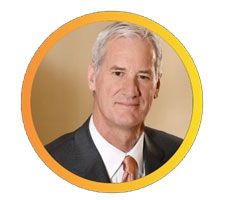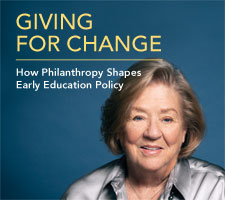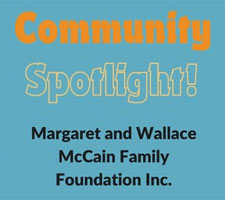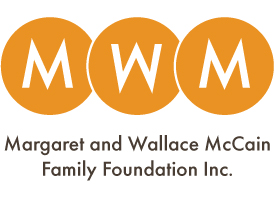What's New
In Boston, Bringing the Best of Pre-K Practices into the Elementary Years

Boston has focused on creating and implementing a curriculum that aligns the content and instructional practices of the pre-K through second grade span.
Mrs. Margaret Norrie McCain Tribute Video

Children's Aid Foundation of Canada, October 21, 2025 Description: "This tribute celebrates the extraordinary legacy of The Honourable Margaret Norrie McCain, whose lifelong dedication to early childhood education and social justice has transformed lives across Canada. Through the voices of those she has inspired, we honour a visionary philanthropist, a...
How ECEs shape our children's futures

Province to remove barriers, make way for more child care at schools

On Tuesday, Oct. 7, 2025, government tabled Bill 19, the school amendment act. If passed, this act will enable school districts to provide child care to children of all ages, including infants and toddlers. Districts also will be allowed to provide care during non-school days, such as professional development days, and winter, spring and summer breaks.
Daycare in Denmark is a basic right. Could Canada offer the same?

When Lisa Petersen had her first child, she knew she would be heading back to work before long. So when her daughter, Naia, was a few months old, the former B.C. educator logged onto an portal run by the city of Copenhagen and selected her ideal daycare.
Making Numeracy and Literacy Learning Visible in Play-Based Publicly Funded Programs

There is an increased movement toward locating early childhood programs within school environments. However, there remains some tension between long-held perceptions of play and the realities of play-based pedagogies, resulting in increasing pressure for evidence of outcomes in academic skills, such as numeracy and literacy.
The Importance of Junior Kindergarten

Every child deserves the best possible start. Expanding public education to include 4-year-olds through universal junior kindergarten is not just an investment in early learning, it’s an investment in equity, families, and our collective future. By ensuring access for all, we can close gaps before they widen, strengthen communities, and give every child the foundation they need to thrive.
L'importance de la maternelle 4 ans

Chaque enfant mérite le meilleur départ possible. Étendre l'enseignement public aux enfants de 4 ans grâce à la mise en place d'une maternelle universelle n'est pas seulement un investissement dans l'apprentissage précoce, c'est aussi un investissement dans l'équité, les familles et notre avenir collectif. En garantissant l'accès à tous, nous pouvons combler les écarts avant qu'ils ne se creusent, renforcer les communautés et donner à chaque enfant les bases dont il a besoin pour s'épanouir.
Junior Kindergarten: Sustaining current & future labour markets in fast growing communities.

Date: September 22, 2025 Location: Crowne Plaza, Downtown Moncton. Across Canada we are facing challenging economic times. Building a viable work force is critical, and making early learning and child care available for employees is essential. Junior Kindergarten is a popular part of this equation in North America. Currently, just over...
Giving for Change: How Philanthropy Shapes Early Education Policy

What if the key to a stronger, more just society lies in the earliest years of a child’s life? For decades, the Honourable Margaret Norrie McCain has been a driving force for change, championing the power of early education to shape brighter futures. As a trailblazer in public service and...
Highlighting Our Partnership with Mount Saint Vincent University

We’re honoured to be featured by the team at the Early Childhood Collaborative Research Centre (ECCRC), Mount Saint Vincent University, who highlighted our foundation’s work and ongoing commitment to advancing early childhood education. Through partnerships like this, we continue to support innovative research, policy development, and real change for children,...
The Role of Junior Kindergarten in Improving Child Mental Health Outcomes

Discussions about improving mental health outcomes for children often overlook a critical factor: the mental health and well-being of their educators. Research has long highlighted the importance of healthy, supportive environments for early childhood development, yet the working conditions of early childhood educators remain a blind spot.
Government investing $200 million in child-care sector

Government of New Brunswick, March 11, 2025 Excerpt: The provincial government is investing $200 million over five years to extend three child-care agreements with the federal government.One of them, the Canada-New Brunswick Canada-Wide Early Learning and Child Care Agreement, has been extended to March 31, 2031.
The spaces are just not there’: Early childhood educators hope funding will bring better wages, paid sick days

CBC News, March 17, 2025 Description: Newfoundland and Labrador has signed a deal to extend Ottawa’s federal child-care program. It means more $10-a-day spaces are expected. Advocate Patrice Gordon says some parents are being forced to pay for costly private care, while others are leaving the workforce altogether. Watch the...
Affordable child care, a stronger economy

Prime Minister Justin Trudeau, March 6, 2025 Excerpt: "With these extensions, provinces and territories will receive $36.8 billion to move forward on progress to create new child care spaces, reduce waitlists, and hire more early childhood educators across the country. Affordable child care is good for kids and parents, and...
JK Delivering Striking Results in the NWT

When early learning programs are universal, participation soars. This broad reach delivers undeniable benefits, particularly for vulnerable children who stand to gain the most.
Does Expanding Education "Schoolify" Early Development?

Canada is moving toward expanding education to include four-year-olds. Nova Scotia, Ontario, and the Northwest Territories have strong models in place, while Quebec is phasing it in. Alberta, Manitoba, and Saskatchewan have targeted programs that are raising interest.
What is the Significance of the Lancet Series on The Next 1000 Days?

The release of new research on the importance of the early years is hardly news. A plethora of evidence has been established to mould public policy and inform early interventions to optimize the developmental outcomes of young children.


